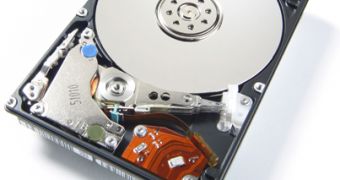Unlike most computer hardware parts, traditional hard disk drives are very hard to improve when it comes to speed, not storage capacity, mind you. A number of solutions exist though, like a faster data transfer interface between the hard disk drive and its mainboard controller, higher rotational speeds, larger amounts of buffer memory and so on.
Another approach, advocated by the solid state drive manufacturers is the complete replacement of the traditional non volatile and long term data storage system that is based on platters and moving parts with the flash based memory chips that are more resilient, less power consuming and in some circumstances, much faster. The problem with SSDs is that they are yet to come with a decent storage capacity that can be affordable to the average end user. The solution that got a lot of attention lately was a middle one: the hybrid hard disk drive that should combine the best features of the both technologies. According to the news site News.com citing the Seagate Technology chief executive officer, Bill Watkins, the biggest hard disk drive manufacturer in the whole world is going to enter the market of HDDs that are built around flash memories.
"We are going to have a solid state drive, probably for enterprise first," Bill Watkins said during an interview on Wednesday. "We think we can make these drives better." As the flash based storage drives (also known as solid state drives or SSDs) have no moving parts, and since they are gaining some momentum on the market because of their increased data transferring speeds and because they are finally doubling their storage capabilities every few months, Seagate decided that is better not to fight the market trend, but rather explore and make the most of it.
As at the moment Seagate has no flash production lines, the hardware manufacturing company is dependent on external shipments from other companies, like Samsung that are specialized in NAND memory chips. According to the Seagate CEO, the flash memories will never dominate the storage market but they might get as high as seven percent of the whole storage market and the opportunity for flash drives will mostly be in the 400GB to 500GB storage range in a few years, if problems concerning the data densities are resolved and prices are lowered. Until then, Seagate is happy to manufacture and ship its hybrid hard disk drives that are traditional HDDs that include a certain amount of flash memories in order to make them faster.

 14 DAY TRIAL //
14 DAY TRIAL //